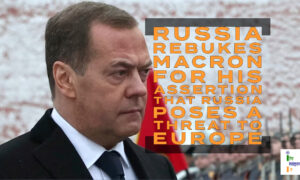
G7 Foreign Ministers pledged to intensify sanctions against Russia over its war in Ukraine
The Foreign Ministers of the Group of Seven (G7) economies have pledged to intensify sanctions against Russia over its war in Ukraine and criticised China for its actions in the Taiwan Strait and disputed South China Sea.
The G7 group comprises the United States (U.S.), Japan, Germany, the United Kingdom (U.K.), France, Italy and Canada. The pledge marked the conclusion of a 3-day meeting in the Japanese resort town of Karuizawa.
The major areas of concern were Russia’s invasion of Ukraine and China’s increasing assertiveness against, and military manoeuvres around, Taiwan, the self-governing democracy that China claims as its own.
The Foreign Ministers also criticised North Korea over its nuclear and ballistic missile programme. They also expressed concern over the violence in Sudan and Myanmar and called on the Taliban to reverse its ban on women working for Non-Governmental Organisations (NGOs) and the United Nations (U.N.). A document was prepared which will serve as a template for global leaders at a G7 Summit that will be held in Hiroshima, Japan in May 2023.
A Statement from Foreign Ministers read, “There can be no impunity for war crimes and other atrocities such as Russia’s attacks against civilians and critical civilian infrastructure.”
It further read, “We remain committed to intensifying sanctions against Russia, coordinating and fully enforcing them.”
Russia’s current offensive is largely stalled and Ukraine is preparing a counter-offensive, but there is a widespread global concern that the President of Russia – Vladimir Putin might deploy tactical nuclear weapons.
The G7 Foreign Ministers said, “Russia’s irresponsible nuclear rhetoric and its threat to deploy nuclear weapons in Belarus are unacceptable.”
They added that any use of chemical, biological or nuclear weapons in Ukraine “would be met with severe consequences. Prior to this, Putin had said that Russia would station shorter-range, so-called tactical nuclear weapons on its neighbour’s territory.
They reiterated their call for China to act as a responsible member of the international community, agreeing that peace and stability in the Taiwan Strait is an indispensable element in the security and prosperity of the international community. They opposed China’s militarisation activities in the South China Sea and said that there is no legal basis for China’s expansive maritime claims.
They urged North Korea to refrain from further nuclear tests and ballistic missiles, warning of a swift, united, and robust international response. The warning comes days after North Korea said it had successfully tested a solid-fuel Inter Continental Ballistic Missile (ICBM), hailing it as a breakthrough for the country’s nuclear counterattack capabilities. That launch was the latest in a string of banned weapons tests conducted by North Korea, which has already fired several of its most powerful ICBMs this year.
Talking of Sudan, the Foreign Minister urged General Abdel Fattah al-Burhan, who heads the military, and his rival, Mohamed Hamdan Dagalo, who commands the paramilitary Rapid Support Forces (RSF), to end hostilities immediately and return to negotiations. The fighting, which erupted over a disagreement on integrating the RSF into Sudan’s military, has killed nearly 200 people and forced the closure of the country’s international airport.
They also condemned the ongoing violence in Myanmar, where the military staged a coup 2 years ago and is engaged in nationwide battles with civilian militias opposed to its rule, expressing deep concern over the deteriorating security and humanitarian situation in the Southeast Asian country.
Source: Al Jazeera







